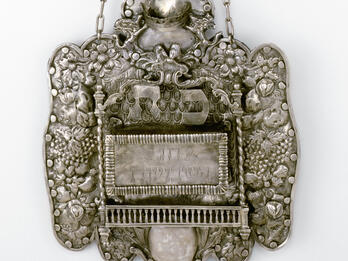Sefer ḥerev pifiyot (The Double-Edged Sword)
Good morning to the Jews.
A good morning and a good year to my lord.
Where are you going today to insult the gentiles?
I do not understand you.
Have not you Jews vowed to wrong the gentiles every day?
It is no wonder that you [gentiles] believe in many airy-fairy things, as you believe this matter too, which originates from scoffers.
Truth to tell, I have heard trustworthy people saying that you Jews curse the gentiles daily and vow to rob them.
That is a lie, but it is true that we daily render thanks to God that He has not made me a gentile.
Come along with me and let us hold a debate together.
I do not wish to dispute with you for a number of reasons.
Tell me what the reasons are.
The first reason is that if I were to say anything that you do not like, and you have no answer to give me, you will then become angry. Secondly, if I were to ask you who permitted you to add to or to detract from the Law of Moses, you will reply to me that the Pope may affirm or abolish anything he desires. Thirdly, you gentiles say that everything is dependent on faith, and that one who believes in Jesus and is baptized becomes worthy of the world to come, whereas one who does not believe in him and is baptized goes down to hell; and if you claim that, it is futile to dispute together.
Say whatever you wish, as I hereby pardon you in advance and offer you an assurance that I shall not argue in the manner that you have indicated.
You are the one who summoned me to debate: hence you may say whatever you wish, and I shall respond to you!
Is it not written in your Torah: By the word of two or three witnesses shall a matter be established (Deuteronomy 19:15)? Well, if so, why do you [Jews] not believe in the evangelists, who were four in number?
Before I respond to you on this point, tell me the meaning of this term evangelists.
The word evangelists means something which is true and concerning which there is no doubt.
Kindly tell me whether it is a Latin word or an Arabic or a Chaldean word, or whatever language it may be.
I do not know what language it is, and likewise, in the standard formularies of our books of prayer there are a number of strange words which we do not understand and we do not know from what language they come, and one of these crops up when we bury any deceased person; namely, when at the conclusion of the liturgy, among the words that we priests pronounce over him, we recite thrice the following three words, and we do not know what they are, and what their meaning is—and these are “Kari alay ason” [i.e., Kyrie Eleison; “Lord, have mercy”]—and accordingly, you Jews, who are conversant with several languages, will do me the favor of informing me of the meaning of these words.
I am conversant with the Hebrew language, and I will tell you whatever I know about this: the word evangelism denotes “good tidings” and accordingly, your four “evangelists” signify “tellers of good tidings”; indeed, learned Christians have informed me that it is indeed an expression denoting good tidings. And these three words (Kari alai ason—[Hebrew for: “A misfortune has befallen me]) are from the Hebrew language, and every schoolchild knows enough to advise you as to their meaning; and therefore, in my view, whoever instituted these three words for you [to be recited in your prayers], it is nothing other than a matter of shame and derision for you. And accordingly, as for these “bringers of good tidings,” who were named Matthew, Mark, Luke, and John, they proclaimed everything that was later written under their names by way of good tidings. Hence it seems plain that, prior to them, and until their emergence on the scene, everything in this regard was hidden and concealed from everyone, and there was no record of this matter whatsoever until these four arose, and it was they who stated all these matters—in relation to the history of Jesus and all his deeds, and his death, and all the deeds of Paul, and all the letters written by him—all of this was hidden and concealed, and these four bringers of good tidings brought everything to light, into the public arena, by way of relating good tidings, and not by way of prophecy, as they were neither prophets nor the sons of prophets. And they too failed to disclose the source from where they had received these good tidings, whether they had discovered these things in a chronicle of some ancient writer—as there were many people who wrote chronicles—or where they had found all these things. Thus I reply to you that I give no credence whatsoever to the words of the four evangelists; and, had such a phenomenon occurred in these current generations, the contemporary princes and judges would have made due investigation as to the source of these good tidings of theirs, and they would not have given permission for the matters to be written down and published, as they did in those days, which are referred to as “antiquity.” Now that being the case, how could it enter your mind that I should abandon the perfect law of the Almighty, which was given at a public ceremony, to the accompaniment of thunder and lightning in the sight of the entire nation upon Mt. Sinai, from the very mouth of the Almighty Himself, and that you should desire me to believe in the four evangelists, who fail to mention the source from which these good tidings had come to them? And in particular, there is the fact that in numerous instances within their words, they contradict one another; for example, Matthew traces [Jesus’] genealogy—that he came from David and his son Solomon, from the royal lineage—and proceeds to reckon twenty-eight generations from David up to Jesus, whereas Luke traces his line of descent from Nathan, the son of David, without making any mention of Solomon at all, and he proceeds to reckon forty-two generations from David up to Jesus. And this is similarly the case with many matters where one [evangelist] does not speak in a manner consistent with what is stated by another.
Credits
Published in: The Posen Library of Jewish Culture and Civilization, vol. 5.




